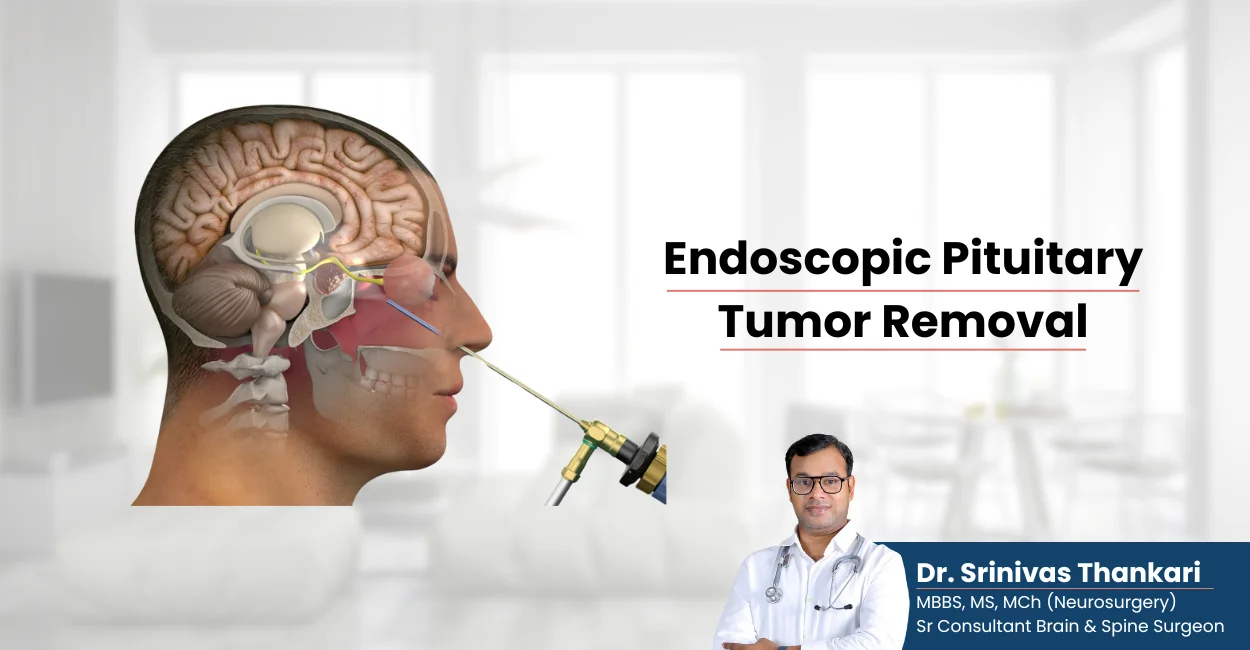
Endoscopic Pituitary Tumor Removal | Expert Neurosurgery in Hyderabad
Endoscopic pituitary tumor removal is a minimally invasive surgical procedure used to remove tumors located in the pituitary gland, a small but vital gland at the base of the brain.
Dr. Srinivas Thankari, a highly skilled brain and spine surgeon in Uppal, Hyderabad, performs this procedure to treat both benign and malignant pituitary tumors, ensuring minimal disruption to surrounding tissues.
What is a Pituitary Tumor?
Pituitary tumors are abnormal growths in the pituitary gland, which regulates hormones affecting growth, metabolism, and reproduction. While many pituitary tumors are non-cancerous (adenomas), they can cause hormonal imbalances and exert pressure on nearby structures, such as the optic nerves.
Indications for Endoscopic Pituitary Tumor Removal
This surgery may be recommended for:
-
Hormone-secreting tumors: Causing conditions like Cushing’s disease, acromegaly, or prolactinoma
-
Non-secreting adenomas: Large tumors causing headaches or vision problems
-
Optic nerve compression: Tumor pressing on the optic nerves, leading to vision loss
-
Pituitary apoplexy: Sudden bleeding into a tumor, causing severe symptoms
-
Persistent hormonal imbalances unresponsive to medications
Symptoms of Pituitary Tumors
-
Headaches or unexplained fatigue
-
Vision changes, such as double vision or loss of peripheral vision
-
Unexplained weight gain or loss
-
Hormonal disturbances, including irregular periods or sexual dysfunction
-
Growth abnormalities in children or adults
-
Excessive thirst or urination
Diagnosis of Pituitary Tumors
Dr. Srinivas uses the following diagnostic tools to accurately detect pituitary tumors:
-
MRI Scans: Provide detailed images of the brain and pituitary gland.
-
Blood Tests: Measure hormone levels to detect imbalances caused by the tumor.
-
Visual Field Testing: Checks for vision loss caused by optic nerve compression.
-
CT Scans: Useful when MRI is not feasible, providing images of the skull and brain structures.
Procedure: Endoscopic Pituitary Tumor Removal
This surgery is performed through a transnasal endoscopic approach, where the surgeon accesses the tumor through the nasal passages, eliminating the need for an external incision.
Preparation:
Pre-operative imaging and hormone evaluations to plan the procedure.
-
Surgical Access: A thin endoscope is inserted through the nostrils to reach the tumor.
-
Tumor Removal: The tumor is carefully removed using specialized instruments while preserving healthy tissue.
-
Closure: The area is sealed, often using tissue from the patient’s nasal lining.
Benefits of Endoscopic Pituitary Tumor Removal
-
Minimally Invasive: No visible scars and faster recovery
-
Precise Tumor Removal: Lower risk of damaging surrounding structures
-
Quick Symptom Relief: Restores vision and corrects hormonal imbalances
-
Shorter Hospital Stay: Faster return to daily activities
Post-Operative Care and Recovery
After the surgery, Dr. Srinivas provides personalized post-operative care to ensure a smooth recovery:
-
Hormonal Monitoring: Regular hormone level checks to prevent imbalances
-
Vision Assessment: Follow-ups to monitor any changes in vision
-
Pain Management: Minimal discomfort managed with medication
-
Follow-Up Appointments: Routine check-ups to ensure long-term success
Why Choose Dr. Srinivas Thankari for Pituitary Tumor Surgery in Hyderabad?
-
Extensive Expertise: Skilled in advanced endoscopic techniques for tumor removal
-
Minimally Invasive Approach: Faster recovery with minimal complications
-
Comprehensive Care: From diagnosis to post-operative follow-up
-
Child-Friendly and Adult Care: Expertise in treating pituitary conditions for patients of all ages
If you are experiencing hormonal imbalances, headaches, or vision issues, consult Dr. Srinivas Thankari for expert endoscopic pituitary tumor removal in Uppal, Hyderabad. With his advanced surgical expertise, you can expect safe, precise treatment and a faster return to your normal life.

